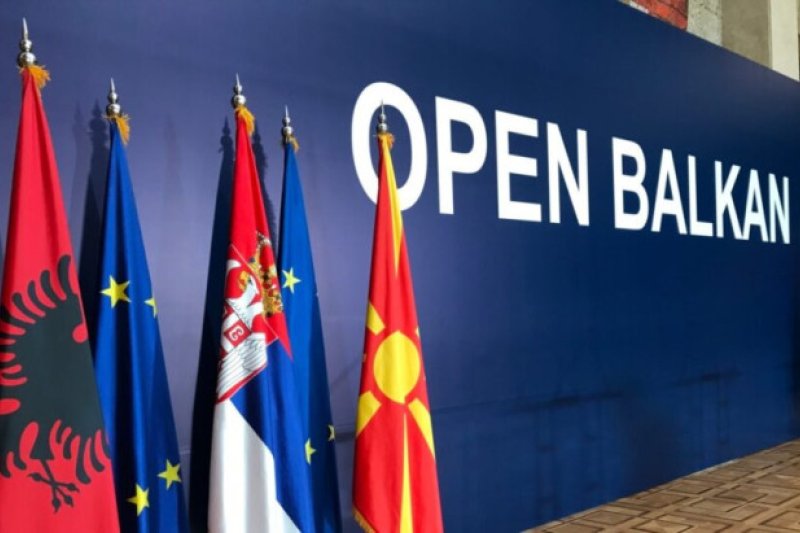The 'Forgotten' Open Balkans
Nowadays, the Open Balkans initiative is rarely mentioned, even by its promoters—Albanian Premier Edi Rama and Serbian President Aleksandar Vucic—who had unsuccessfully pressed all regional countries to join it at the time of its launch. North Macedonia later joined the group, while Kosovo and Bosnia and Herzegovina rejected it. Montenegro never joined but maintained a "wait and see" stance to appease the promoters, ultimately choosing to remain out due to its reservations. Montenegro was, after all, the frontrunner in the EU accession process.
Framed as a regional initiative that could challenge EU cooperation, the Open Balkans, promoted by Serbia, Albania, and North Macedonia, was launched in October 2019 with a declaration signed in Novi Sad by the leaders of the participating countries, followed by two additional joint declarations signed in Tirana and Ohrid. The primary goal was to create a regional common market—mirroring the EU model—to enable the free movement of goods, services, capital, and people (the so-called "four freedoms").
The motivation behind the initiative stemmed from the halt in European enlargement, which reflected a broader “enlargement fatigue.” While the European prospects of the Western Balkans were not entirely lost, they appeared significantly weakened by statements from top EU officials asserting that the EU needed to reform itself before welcoming new members.
In response to the enlargement moratorium announced in 2014 by Jean-Claude Juncker, the Western Balkans were offered an alternative: the so-called Berlin Process—a regional cooperation initiative spearheaded by Germany. It was yet another "project transfer": a cooperation idea conceived within the EU and then handed over to the Western Balkans to implement and further develop.
However, despite the efforts of former German Chancellor Angela Merkel, the Berlin Process never succeeded in fulfilling the ambition of Western Balkan countries to accelerate their EU accession. As Merkel stepped down, the initiative was nearly forgotten. Her successor attempted to revive it with a summit, but the promises made were never fully realized. A few cosmetic projects were not enough to satisfy the region’s ambition to join the EU—a goal that the EU itself seemed to sideline due to internal challenges, further complicated by Brexit. (No one anticipated the crises ahead, such as Russia’s aggression against Ukraine or the rise of Donald Trump in the White House.)
Nonetheless, the Open Balkans initiative failed to make substantial progress beyond fostering a visible rapprochement between Rama and Vucic—an alignment that did not go unnoticed by other regional leaders. Some countries that declined to join the initiative expressed concern over potential Serbian dominance.
The initiative aimed to be a domestic project, championed by Western Balkan leaders eager to demonstrate their capacity for fostering regional cooperation. But it fell short. As noted by Osservatorio Balcani Caucaso Transeuropa:
"Each of the countries involved perceived the possible benefits of the initiative in its own way. For Albania, the opening of the border with Kosovo would allow Albanians on both sides to enjoy the four freedoms without constraints. For Serbia, the initiative could lead to détente, hinting at an informal normalization of Belgrade-Pristina relations. For North Macedonia, it was an opportunity to regain political momentum at the regional level, after the Prespa Agreement and the name change had left a sour taste among the public and political elites."
It is natural to ask what the Open Balkans actually achieved, despite being a quasi-imitation of the Berlin Process. Crucially, it failed to meet the three fundamental criteria for successful regional cooperation: high-level political leadership, capable administrative capacity, and substantial budgetary support.
What concerned many constructive regional leaders most was the lack of attention from Brussels, which appeared indifferent to the rhetoric of Rama and Vucic—particularly during moments of EU indecision, such as delays in opening accession talks with Albania and North Macedonia, or the failure to grant visa liberalization for Kosovo and candidate status for Bosnia. In this context, the three Balkan leaders believed that a new initiative "from the region and for the region" could serve as leverage to attract EU attention. But their criticisms made little impact, as Brussels understood the limits of the initiative’s promoters. Moreover, EU member states in the Balkans showed little sympathy for it. The threats of potentially turning toward Russia or China were not taken seriously, as Brussels remained confident in the European orientation of nations like Albania and North Macedonia. Serbia, by contrast, was seen as continuing its balancing act between East and West.
Yet, as is often the case in life—and politics—“you never know.” Russia’s aggression against Ukraine triggered significant shifts within the EU, including a renewed focus on the Western Balkans. Meanwhile, a trade war under the Trump administration and China’s opportunistic maneuvers compelled the EU to reassess its economic relationships and strategic positioning.
This evolving geopolitical context led Brussels to reconsider its stance on enlargement. While skepticism remains, it is no longer dominant. Albania and Montenegro are now seen as frontrunners in the accession process, though no country is being left behind—provided it fulfills its obligations.
Today, the Open Balkans initiative can be seen as a political exercise of the past, with limited achievements. All eyes are now on 2030—the target year for EU accession for Albania and other Western Balkan countries. /ADN













